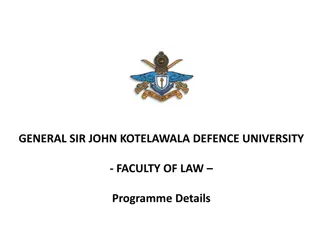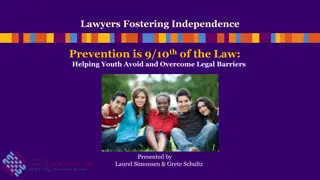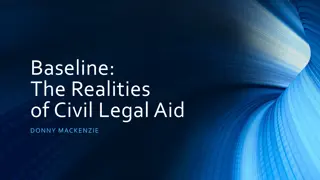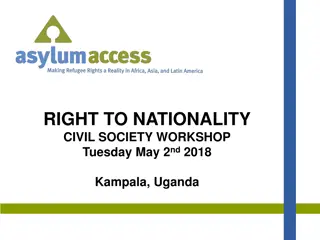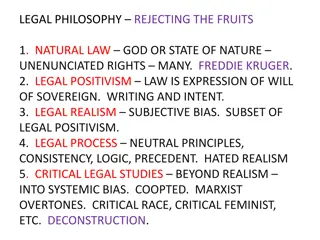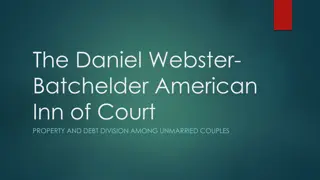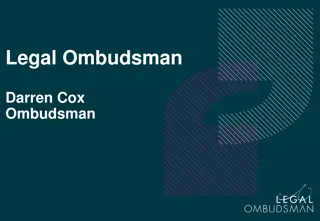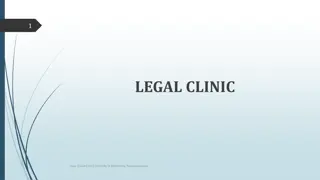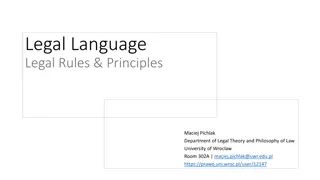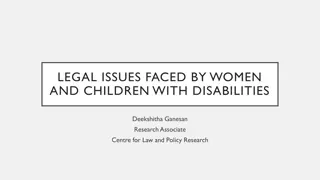Parental Rights and Responsibilities in Educational Settings
Explore key topics such as responding to parental disagreement, abuse and neglect reports, student discipline, data privacy, discrimination, bullying, special education disputes, custody rights, and access to student records as per Minnesota statutes. Understand the presumption of parental right to access data and the requirements for noncustodial parent access to school records. Delve into scenarios where parental consent is crucial, including special education evaluations, enrollment decisions, custody disputes, and legal orders for protection.
Download Presentation

Please find below an Image/Link to download the presentation.
The content on the website is provided AS IS for your information and personal use only. It may not be sold, licensed, or shared on other websites without obtaining consent from the author.If you encounter any issues during the download, it is possible that the publisher has removed the file from their server.
You are allowed to download the files provided on this website for personal or commercial use, subject to the condition that they are used lawfully. All files are the property of their respective owners.
The content on the website is provided AS IS for your information and personal use only. It may not be sold, licensed, or shared on other websites without obtaining consent from the author.
E N D
Presentation Transcript
By Jill Coyle January 26, 2018
Todays Topics Responding to Parental Disagreement Subpoenas 101 Abuse and Neglect Reports Student Discipline Data Privacy 101 Discrimination, Bullying & Harassment Common Special Education Disputes
Physical Custody Visitation Legal Custody Parental Rights
Presumption of Parental Right to Access (Minn. R. 1205.0500, subp. 2) (paraphrased) The school shall presume a parent has the authority to access data on the child unless the school has been provided with evidence that there is a state law or court order governing such matters as divorce, separation or custody or a legally binding instrument which provides to the contrary.
Minn. Stat. 120A.22 COMPULSORY INSTRUCTION Subd. 1a. Noncustodial parent access to records. Upon request, a noncustodial parent has the right of access to, and to receive copies of, school records and information, to attend conferences, and to be informed about the child's welfare, educational progress, and status, as authorized under section 518.17, subdivision 3. The school is not required to hold a separate conference for each parent.
Minn. Stat. 13.32 EDUCATIONAL DATA. Subd. 10a. Access to student records; school conferences. (a) A parent or guardian of a student may designate an individual to participate in a school conference involving the child of the parent or guardian. The parent or guardian must provide the school with prior written consent allowing the significant individual to participate in the conference and to receive any data on the child of the consenting parent or guardian that are necessary and relevant to the conference discussions. The consenting parent or guardian may withdraw consent, in writing, at any time.
Lets Talk About When one parent consents to a special education evaluation and the other refuses. When parents disagree over: school of enrollment who can pick up the child the rights of a step-parent Requests for letters or affidavits for use in a custody proceeding Orders for Protection & Harassment Restraining Orders
Testimony Records Witness Fees Time Off Work
Sample Subpoena Letter The purpose of this letter is to inform you in writing that Independent School District No. for your child s school records and/or to testify about your child. The records and/or testimony were subpoenaed in a matter captioned [fill in caption on subpoena]. The records and/or testimony were subpoenaed by has received a subpoena Federal law (34 CFR 99.31(a)(9)) requires the School District to notify you of the subpoena in advance of compliance in order to provide you time to seek a protective order if you so desire. The School District plans to produce the subpoenaed records and/or testify on ,unless you have obtained a protective order by this time. Thank you for your attention to this matter.
Mandated Reports Mandated Reporting Know or reasonably suspect a child has been maltreated in past 3 years Maltreatment=physical abuse, sexual abuse, threatened abuse, neglected If you believe a child has been maltreated, report it immediately to your supervisor and the proper authorities If you suspect a school district employee has maltreated a child, report it to Minnesota Department of Education. (651-582-8546) If you suspect a parent (or someone else with authority over child) has maltreated a child, report it to County Child Protection Services. In emergencies, call 911 and report to police Timelines: 24 hours for a verbal (phone) report; 72 hours for follow-up written report Immunity for good faith reports Identity of reporter is kept confidential
Lets Talk About . . . When a staff member is the alleged perpetrator. When a sibling is the alleged perpetrator. When another student is the alleged perpetrator.
Disciplinary Trends Limits on expulsion (case law) Restorative measures and trauma informed schools Disproportionality concerns
Discipline of Special Education Students we better have a flow chart.
45-Day Placements Available for certain weapons or drug offenses or when a student inflicts serious bodily injury on another at school. School days, not calendar days. Can be imposed even if conduct is a manifestation. Nature of placement is determined by IEP team. Subject to parental challenge, but the 45-day placement is the stay put.
Protections for students not yet eligible. IDEA protections are available if the school has knowledge that the student was a child with a disability before the conduct occurred. There is a basis of knowledge if: Parent expressed concern in writing that the student needed special education. Parent requested an evaluation Staff expressed concern about a pattern of behavior to director of special education or other supervisor.
Protections for students not yet eligible. IDEA protections are not available if: Parent did not allow for a special education evaluation. Parent refused special education services. Child was evaluated for special education services and did not qualify.
The last minute referral. If a request is made for a special education evaluation after conduct occurs, the evaluation must be done in an expedited manner Child remains in placement determined by school, which can include suspension or expulsion. If child is found eligible, special education services must be provided.
10-Day Rule for Mental Health Referrals Minn. Stat. 121A.45 GROUNDS FOR DISMISSAL Subd. 3.Parent notification and meeting. If a pupil's total days of removal from school exceeds ten cumulative days in a school year, the school district shall make reasonable attempts to convene a meeting with the pupil and the pupil's parent or guardian before subsequently removing the pupil from school and, with the permission of the parent or guardian, arrange for a mental health screening for the pupil. The district is not required to pay for the mental health screening. The purpose of this meeting is to attempt to determine the pupil's need for assessment or other services or whether the parent or guardian should have the pupil assessed or diagnosed to determine whether the pupil needs treatment for a mental health disorder.
The handling of student records is governed by state and federal law. Minnesota Statute 13.32 (Minnesota Government Data Practices Act) 20 USC 1232g (Federal Educational Rights and Privacy Act F.E.R.P.A. )
Three Classifications in MN Law Public Private Confidential
A limited amount of student information is classified as public directory information. Directory information typically includes: Name Address, telephone and email (but not in all school districts) Date and place of birth Major field of study Participation in activities and sports Weight and height of athletes Dates of attendance Enrollment status Degrees, honors and awards received The most recent educational institution attended Photograph Grade level
Most student information collected or maintained by schools is classified as private. Private information may not be released to members of the public without consent or as otherwise specifically permitted by law.
Private data may only be shared within the School District on a need-to-know basis. Avoid teachers lounge gossip Consider keeping student identity private when discussing a situation with colleagues. Need-to-know extends to volunteers and contractors.
Private data may not be shared outside the District without consent or as otherwise permitted by law. Exercise extreme caution with disciplinary information. Exercise extreme caution with disability information. Exercise extreme caution with your community conversations.
Parents have a right to access all of their own childs private data. Use caution when e-mailing colleagues. Don t put something in writing that you will later regret. Watch out for commingled data. Noncustodial parents do not generally lose the right to access student data. The Desk Drawer Exception is a very limited exception. Data can t be shared with anyone other than a substitute teacher. Data must be destroyed at the end of the year.
A very limited amount of data may be classified as confidential. Confidential data is not accessible by the data subject.
Keezer Data Unrecorded mental impressions don t count as data. Exercise extreme caution before assuming information is only an unrecorded mental impression.
Civil Remedies and Penalties Lawsuit for damages or compliance (M.S. 13.08) Attorney s fees Civil penalty Injunction (M.S. 13.08) A willful violation is a misdemeanor (M.S. 13.09) Cause for suspension or dismissal (M.S. 13.09)
I.E.E.s (Independent Educational Evaluations) Parents can obtain an I.E.E. at their own expense. Parents have a right to an I.E.E. at public expense if they disagree with an evaluation by the district. To refuse an I.E.E., the district must ask for a due process hearing and prove that its own evaluation was appropriate. Districts cannot simply ignore a parent s I.E.E. request. District s must provide information about their criteria for I.E.E.s.
Implementation Errors Don t overpromise Collect data Share the IEP with all whom have the responsibility to implement adaptations Remedy errors if possible
Resistance to Restrictive Settings Hold meetings Arrange tours Document the IEP team s proposal Collect data Try mediation Consider a hearing???
Formal Dispute Processes MDE Complaints Special Education Maltreatment Board of Teaching OCR Complaints MDHR Charges Data Privacy Complaints Due Process Hearings Lawsuits
Gather all records Involve counsel and insurer Don t be obstructionist or defensive Tell your story clearly Remedy errors if they exist
Bullying Bullying means: Intimidating, threatening, abusive, or harming conduct that is objectively offensive and: There is an actual or perceived imbalance of power between the student engaging in the conduct and the target of the conduct and the conduct is repeated or forms a pattern, or Materially and substantially interferes with a student s educational opportunities or performance or ability to participate in school functions or activities or receive school benefits, services or privileges Cyberbullying is prohibited For a school s bullying policy to apply, there typically must be a nexus between the conduct and the school environment Each school district is required to have a bullying policy, a process for investigating complaints and to offer staff training.
Bullying Resources on bullying in schools can be found on the MDE s School Safety Technical Assistance Center webpage: http://education.state.mn.us/MDE/dse/safe/
Discrimination & Harassment State and federal law, as well as school district policies, prohibit students or staff from harassing or discriminating against others on the basis of protected class. Protected class=sex, race, religion, color, creed, national origin, marital status, familial status, disability, status with regard to public assistance, sexual orientation, membership or activity in a local human rights commission age or genetic information Harassment can be physical and/or verbal
Lets Talk About . . . Rights of transgender and gender diverse students Title IX complaints When the complainant asks you not to do anything or to guarantee confidentiality Responding to false accusations





